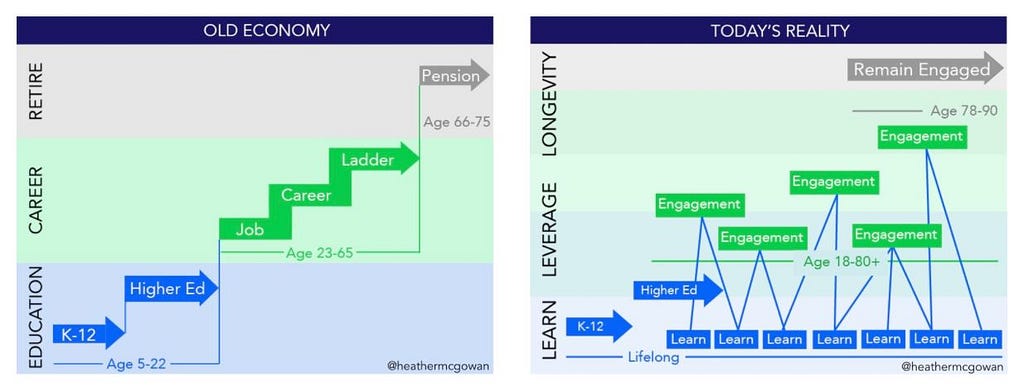Latest news about Bitcoin and all cryptocurrencies. Your daily crypto news habit.
 Courtesy of Scott Webb
Courtesy of Scott Webb
Gone are the days of dedicating a third of your life to gaining an education, spending another third working and the final third retiring and living off a pension. Millennials will account for over 75% of the global working population by 2025 (Deloitte, 2014). Unlike their parents generation they are not committed to staying at a single organisation over the course of 10 years, let alone 20.
Millennials have grown up with the internet as their sibling and created diverse ways to create value and derive multiple streams of income. Ranging from ad revenue from Youtube, blogging on Medium, selling goods on Amazon to teaching an online course on Udemy. All whilst holding down a 9–5, day dreaming about their side projects.
The one piece of advice that has stuck with me throughout my career is that:
“Regardless of your job title, we are all in the relationship building business.”
This rings truer than ever for employers who are stuck with the issue that they are investing heavily in recruiting, training and upskilling candidates who leave after just 2 or 3 years. I believe the role of HR and organisations at large will need to change to adapt to this more fluid pipeline of workers.
 Heather McGowanIf you want to build an effective network, you must focus on what you can do for other people, not what they can offer you.
Heather McGowanIf you want to build an effective network, you must focus on what you can do for other people, not what they can offer you.
Truth is, Millennials aspire to live a particular lifestyle which no long places working for a big brand at the epicentre of that vision. Rather companies play just a part of a bigger picture as Millennials find purpose at work anchored in the following four categories:
- Inclusion — An environment where you can bring your whole self to work and have your voice heard and acted upon.
- Growth — A place which nurtures life long learning opportunities.
- Positive Impact — Purpose over paychecks, people value making a meaningful impact on the world.
- Meaningful Relationships — People want to forge in-depth, mutually-beneficial relationships based on shared values and mutual appreciation of each other.
As a result of the above, I believe we will see more Millennials enter into the “Alternative work” category. This category of work is not limited to the Gig Economy but rather centered around continuous learning and flexible work opportunities that fit around a desired lifestyle. The future of work will consist of a medley of part-time roles doing meaning work. A typical week could consist of taking your kids to school, working just two days a week at a Corporate, a day or two at a coworking space on Consulting projects and speaking engagements, a day on brand building, giving back and spending time nurturing relationships in your intimate network.
It is no surprise that Deloitte found that 92% of millennials believe that business should be measured by more than just profit and should focus on a societal purpose. Whilst 30% of millennials say that meaningful work is important versus only 12% of managers. Millennials value close-knit collaboration, meaningful work and culture over pay and are determined to design a lifestyle where individual and employee is one in the same.
Millennials will still be developing their skills and be very much in the career game, still earning money, but happier, more intellectually fulfilled, and with infinitely more flexibility. For many millennials, this article paints an inspirational view of a life they are working towards. To some, it is already a reality.
What gives you purpose at work? Looking forward to reading your comments below.
The Future of Working for Millennials was originally published in Hacker Noon on Medium, where people are continuing the conversation by highlighting and responding to this story.
Disclaimer
The views and opinions expressed in this article are solely those of the authors and do not reflect the views of Bitcoin Insider. Every investment and trading move involves risk - this is especially true for cryptocurrencies given their volatility. We strongly advise our readers to conduct their own research when making a decision.
